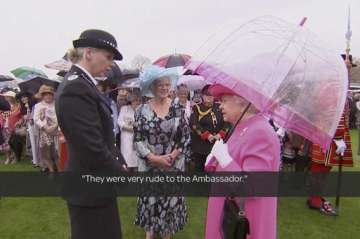China bans BBC after Queen Elizabeth refers to Chinese delegation as 'Very Rude'
London: Britian’s Queen Elizabeth II was overheard on camera calling members of Chinese delegations "very rude", a rare diplomatic gaffe by the British monarch. Her conversation with a senior police officer at a Buckingham Palace

London: Britian’s Queen Elizabeth II was overheard on camera calling members of Chinese delegations "very rude", a rare diplomatic gaffe by the British monarch.
Her conversation with a senior police officer at a Buckingham Palace event was recorded by a pool cameraman authorised to cover the event and then broadcasted by BBC.
The incident did not go well with China, which reacted by censoring BBC’s coverage of the event on TV and blocking the webpages carrying the news.
The BBC said a BBC World broadcast about the incident was blanked out in China.
Buckingham Palace said it would not comment on the queen's private conversations.
The queen's comment came hours after Prime Minister David Cameron was caught on microphone calling Nigeria and Afghanistan "fantastically corrupt."
Police commander Lucy D'Orsi was introduced to the queen as the woman who oversaw security for the visit of President Xi Jinping and his wife in October, to which the monarch replied: "Oh, bad luck".
D'Orsi was recorded as saying, "I'm not sure whether you knew, but it was quite a testing time for me," to which the queen is heard replying: "I did".
The officer recalled a moment when Chinese officials walked out of a meeting with Barbara Woodward, British ambassador to China, in which the Chinese told the Brits the trip was off.
The queen went on to say to D'Orsi that members of the Chinese delegation "were very rude to the ambassador" and exclaiming: "Extraordinary!".
The police commander agreed, saying, "It was very rude and very undiplomatic I thought".
It was not clear which members of the delegation they were referring to.
Both the Metropolitan police and the palace refused to comment on what they described as private conversations. The palace stressed that Xi's visit had been "extremely successful."
British officials laid on dollops of pomp and splendor — including a state banquet at the palace — during Xi's four-day state visit to nurture the U.K.'s developing economic relationship with China.
The two countries signed more than 30 billion pounds ($46 billion) in trade agreements during the trip, and Cameron said Britain would be China's "partner of choice" in the West.
Asked about the queen's reported remarks at a daily news briefing in Beijing on Wednesday, Foreign Ministry spokesman Lu Kang declined to address them directly, but said Xi had made a "very successful visit" to Britain last year.
"The working teams from both sides made huge efforts to make this possible. This effort has been highly recognized by both China and Britain," Lu said.
Despite Lu's comments, China appeared to regard the reports as sensitive. Information about the queen's comments was difficult to find on China's heavily censored Internet and government monitors cut the signal of the British Broadcasting Company when it reported on the comments.
British Foreign Secretary Philip Hammond said the visit "got a bit stressful on both sides" but had been "highly successful."
He said that "our relationship with China is very strong and has been greatly strengthened by the success of that visit."
This is not the first time British royals have been caught making undiplomatic remarks about the Chinese. Prince Charles branded Chinese diplomats "appalling old waxworks" in a private journal entry that had described the 1997 ceremony to hand Hong Kong back to Chinese rule.
Charles, who is friends with Tibet's exiled spiritual leader, the Dalai Lama, did not attend a state banquet for Xi in October, but did hold private talks with the Chinese leader over tea.
At another palace reception Tuesday, cameras recorded Cameron talking about an anti-corruption summit in London, which he will chair.
"We've got some leaders of some fantastically corrupt countries coming to Britain," Cameron told the monarch. "Nigeria and Afghanistan — possibly the two most corrupt countries in the world."
Afghanistan's Ashraf Ghani and Nigeria's Muhammadu Buhari are due to attend the London summit and each has contributed an essay on his efforts to tackle graft.